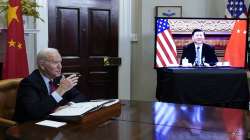President Joe Biden and China’s Xi Jinping spoke for nearly two hours on Friday as the White House looked to deter Beijing from providing military or economic assistance for Russia’s invasion of Ukraine. China’s Foreign Ministry was the first to issue a readout of the video conversation, deploring “conflict and confrontation” as “not in anyone’s interest,” without assigning any blame to Russia.
The video call comes at a crucial time with differences between Washington and Beijing over Russian President Vladimir Putin's prosecution of his three-week-old war against Ukraine. Former Australian Prime Minister Rudd, the current Asia Society President, says China's "the fault line," is to avoid triggering any secondary sanctions against themselves. Foreign policy expert Daniel Hamilton, from the Washington think-tank Brookings says China's current stance could leave it in a strong position with Russia, but it is also runs into the possibility "if they try to evade the sanctions," of facing secondary sanctions themselves.
Earlier this week, the U.S. informed Asian and European allies that American intelligence had determined that China had signaled to Russia that it would be willing to provide both military support for the campaign in Ukraine and financial backing to help stave off the impact of severe sanctions imposed by the West. Senior Fellow and Co-Director of the China-East Asia group at the Stimson Center, Yun Sun,believes the U.S. policy of pre-emptively warning China is effective."Sending a warning signal to Beijing," she said is forcing China to "think about the consequences," of supporting Russia.
Xi and Putin met in early February, weeks before the invasion, with the Russian leader traveling to Beijing for the start of the Winter Olympics. During Putin’s visit, the two leaders issued a 5,000-word statement declaring limitless “friendship.” It is the apparent close personal relationship that Rudd believes "has driven," continued support by China of Russia. But, Rudd warns, the foreign and security policy establishment in Beijing are "acutely conscious," of Europe's perceptions of China's siding with the Russians over Ukraine.
The Stimson Center's Yun says any adjustment of China's position toward Russia could question the to wisdom of putting China in that position. Any change, she says, could be perceived as "a major blunder," that means that Xi Jinping has done something "wrong." The U.S.-China relationship, long fraught, has only become more strained since the start of Biden's presidency. Biden has repeatedly criticized China for military provocations against Taiwan, human rights abuses against ethnic minorities and efforts to squelch pro-democracy advocates in Hong Kong.
But the relationship may have reached a new low with the Russian invasion. In the days after Putin deployed Russian forces in Ukraine, Xi’s government tried to distance itself from Russia’s offensive but avoided criticizing Moscow. At other moments, Beijing’s actions have been provocative and have included amplifying unverified Russian claims that Ukraine ran chemical and biological weapons labs with U.S. support.
The White House says China has been sending mixed messages about its support for Russia. There were initial signs that Chinese state owned banks were pulling back from financing Russian activities, according to a senior Biden administration official who insisted on anonymity to discuss internal analyses. But there have also been public comments by Chinese officials who expressed support for Russia being a strategic partner.
Beijing's leadership would like to be supportive of Russia but also recognizes how badly the Russian military action is going as an overmatched Ukrainian military has put up stiff resistance, according to a Western official familiar with current intelligence assessments.
The official, who was not authorized to comment and spoke on the condition of anonymity, said Beijing is weighing the potential “reputational blowback” of being associated with the Russian camp. The Chinese response to Russia’s request for help “is in the process of being formulated,” the official added. The current caluclation in China, Rudd believes, could change if the political fortunes of Putin change. "This would throw an entirely new done new dynamic into the Russia-China equation," he says.
Also Read | India's legitimate energy transactions shouldn't be politicized: Sources on oil purchase from Russia
Latest World News
